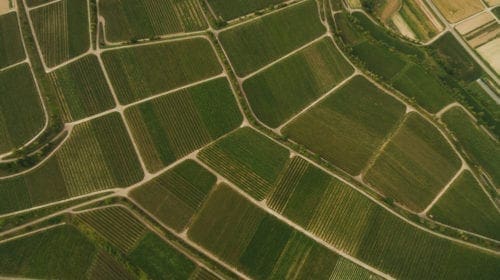The oil and gas industry has evolved tremendously over the years — and so too has the landman profession. Yet until recently, landmen remained bound to their local courthouses for their research needs. The title research process may have been effective, but it was decidedly inefficient.
Today, we’ve reimagined the way landmen carry out their day-to-day jobs through the implementation of online document repositories. Landmen can move beyond in-person visits to their local County Clerk or Recorder offices to access a county’s property records via a single internet search.
From Walk-in Courthouse Visits…
For decades, real property documents were stored at individual county courthouses — first in deed, mortgage and contract books, and later, via microfilm and microfiche. As a result, much of the title research process revolved around in-person visits to individual County Clerk and Recorder offices. Landmen were limited by their courthouses’ hours of operation, as well as time spent traveling between courthouses and waiting for documents and indexes — in essence, their productivity was contingent on the availability of the documents they needed.
…To Online Record Access
In recent years, several County Clerks and Recorders have begun to embrace electronic imaging over microfilm archiving. However, many counties have been reluctant to lose the income they’d enjoyed from charging access to hard-copy documents, and thus, slow to incorporate an online model of access. Today, there are over 3,000 County Recorder and Clerk offices throughout the country, yet only a small percentage provide online image access.
But local courthouses aren’t the only providers of online document access. A number of private companies, including CourthouseDirect.com, now offer online access to grantor-grantee indexes and real property images from multiple counties in one centralized location. In fact, as one of the nation’s largest courthouse document repositories, CourthouseDirect.com provides real property records for over 1,600 U.S. counties and counting.
In addition to standard county clerk documents like leases, liens, judgments, and mortgages, CourthouseDirect.com also offers access to a wide variety of documents that landmen can use to supplement their title chain research, including:
- Assumed Name records
- Birth and Death records
- Marriage and Divorce records
- Probate records
- Tax Assessor’s and Appraisal District records
- Tax, Utility, and Subdivision Maps
Electronic courthouse documents don’t just give landmen instant access to property records from all over the country; they also allow them to save the copies to their computers to refer back to as needed. It’s a far more efficient (and cost-effective) solution than making multiple trips to individual county courthouses to perform ad-hoc research.
Still, some oil and gas professionals are hesitant to embrace digital records. Here are three common concerns we’ve heard from landmen in our industry — along with three ways to address their needs through electronic courthouse records.
Online Record Concerns and Solutions
1) “Online records aren’t as accurate as physical records.”
Despite the trend toward online public records, some clients still harbor doubts over the quality of the data they contain. However, we’ve found that online repositories like CourthouseDirect.com can make the research process far more efficient and accurate than traditional books and microfiche alone.
It is not the practice of a data provider to alter records it obtains from counties but rather to enhance the records and make them easier to search. In fact, CourthouseDirect.com works in concert with clerks and notifies them when errors such as a misspelling occurs. In addition, CourthouseDirect.com builds title plants for title insurance companies who require a high degree of accuracy and up-to-date records.
2) “My client requires me to search records at the county courthouse”.
Some clients mandate that title research be done in-person at the courthouse. Yet online document repositories need not be a replacement for in-person title research; rather, they can be a powerful supplement to traditional research methods, streamlining the process for clients and landmen alike.
At CourthouseDirect.com, we actively encourage our clients to build out their initial run sheets using our online documents before confirming their results at a physical courthouse. This approach allows them to meet client requirements to perform searches at the courthouse, while saving considerable time and expense in the initial research stage — savings they can pass on to their client. The landman is able to save time while fulfilling the client’s requirements and delivering a high-quality research product.
3) “Online document costs are too expensive to reimburse.”
Most landmen are reimbursed by their clients for the cost of travel to and from local courthouses, but few have broached the subject of reimbursement for online document access. In our experience, producers are typically happy to replace the expense of mileage reimbursement for the cost of quality online records.
Not only do online documents tend to cost less than gas and overnight expenses, but they allow the landman to spend less time in transit and more time researching. What’s more, fewer travel expenses mean less administrative and accounting time for both the landman and the client, allowing both parties to improve their productivity.
The Bottom Line
Electronic data delivery has streamlined the research process for countless landmen, while saving time and reimbursement expenses for their clients, as well. Research that once took days or even weeks to complete can now be done with online searches and without time spent traveling to the courthouse or waiting for indexes and documents.
Though some in the industry are still acclimating to the availability of digital records, we believe their value can’t be overstated. Indeed, online courthouse records are no longer the future of title research; they’re a very real requirement for constructing efficient and accurate chains of title.
PaulConesis the President of CourthouseDirect.com. Mr.Coneshas been instrumental in implementing technology solutions for the title, surveying, and oil and gas industries by creating databases and document delivery systems used by most real estate professionals in Texas.








